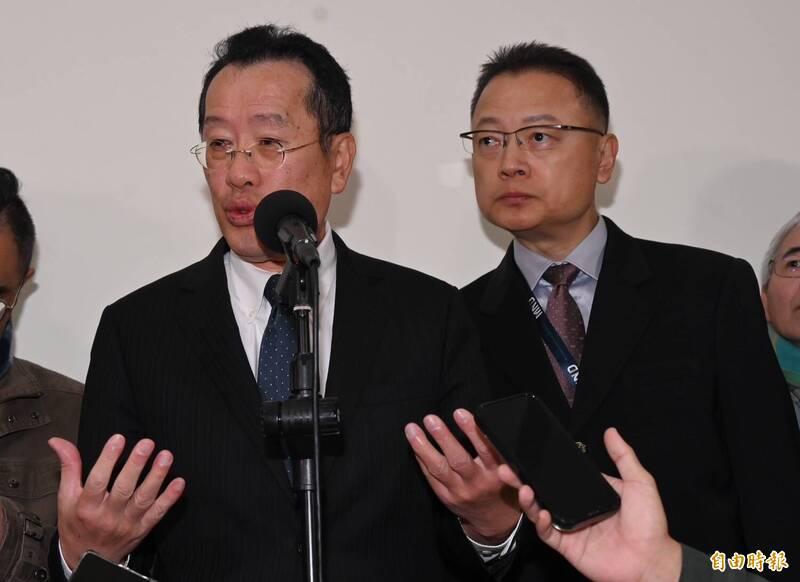Taiwan has to demonstrate that it is determined to defend itself to the new US administration, Minister of National Defense Wellington Koo (顧立雄) said today when asked about a potential defense budget cut.
When asked whether a three-percent budget cut being proposed by the Taiwan People’s Party would convey a wrong message to Taiwan’s allies, Koo said it would affect the military’s operation and investment projects.
The ministry hopes its NT$476 billion (US$14.46 billion) budget could be passed in its entirety in order to signify to the incoming administration of US President-elect Donald Trump that Taiwan is determined to defend itself, he said.

Photo: Liu Hsin-te, Taipei Times
Regarding the Chinese Nationalist Party’s (KMT) proposal to suspend NT$1.8 billion of the ministry’s NT$2 billion budget for the indigenous defense submarine program, Koo said he had “made a promise” that the ministry would only use the budget after the Hai Kun (海鯤), or Narwhal, passes the sea acceptance test which is expected to be held in April, so the ministry does not want the budget to be frozen or slashed.
Speaking about a recent incident in which a Chinese-linked ship was suspected of damaging one of Taiwan’s undersea cables, Koo said Taiwan will dispatch its navy if necessary to help the coast guard respond to any suspicious activity near undersea communication cables.
The authorities said a ship owned by a Hong Kong company but registered in both Cameroon and Tanzania damaged a cable to the north of the island earlier this month, although it says it has not been able to verify the ship's intentions and was unable to board it due to bad weather.
The ship's owner has denied involvement, and China's government has said Taiwan was making up accusations before the facts were clear.
The incident has particularly alarmed Taiwan given it has repeatedly complained about "grey-zone" Chinese activities around it, which are intended to pressure Taiwan without direct confrontation such as balloon overflights and sand dredging.
Speaking to reporters at parliament, Koo said the armed forces would closely coordinate with the coast guard and help monitor areas where sea cables are located.
"Once something happens, the coast guard will go out first, and if needed the navy will immediately cooperate if a response is required," he added.
Also speaking to the media at parliament, National Security Bureau Director-General Tsai Ming-yen (蔡明彥) said the government has already activated a mechanism with "international friends" to exchange information about Chinese "grey-zone" maritime activities, though he did not provide details.
Taiwan's focus will be on ships carrying flags of convenience — those registered in countries other than the one where their actual owner is based in — and how China might be using them in the waters around Taiwan, Tsai said.
The authorities have pointed to similarities between what it experienced and damage to undersea cables in the Baltic Sea following Russia's invasion of Ukraine.
Last week, the government said Chinese ships flying flags of convenience have "the mark of evil about them."

Chinese Nationalist Party (KMT) Chairman Eric Chu (朱立倫), spokeswoman Yang Chih-yu (楊智伃) and Legislator Hsieh Lung-chieh (謝龍介) would be summoned by police for questioning for leading an illegal assembly on Thursday evening last week, Minister of the Interior Liu Shyh-fang (劉世芳) said today. The three KMT officials led an assembly outside the Taipei City Prosecutors’ Office, a restricted area where public assembly is not allowed, protesting the questioning of several KMT staff and searches of KMT headquarters and offices in a recall petition forgery case. Chu, Yang and Hsieh are all suspected of contravening the Assembly and Parade Act (集會遊行法) by holding

PRAISE: Japanese visitor Takashi Kubota said the Taiwanese temple architecture images showcased in the AI Art Gallery were the most impressive displays he saw Taiwan does not have an official pavilion at the World Expo in Osaka, Japan, because of its diplomatic predicament, but the government-backed Tech World pavilion is drawing interest with its unique recreations of works by Taiwanese artists. The pavilion features an artificial intelligence (AI)-based art gallery showcasing works of famous Taiwanese artists from the Japanese colonial period using innovative technologies. Among its main simulated displays are Eastern gouache paintings by Chen Chin (陳進), Lin Yu-shan (林玉山) and Kuo Hsueh-hu (郭雪湖), who were the three young Taiwanese painters selected for the East Asian Painting exhibition in 1927. Gouache is a water-based

Taiwan would welcome the return of Honduras as a diplomatic ally if its next president decides to make such a move, Minister of Foreign Affairs Lin Chia-lung (林佳龍) said yesterday. “Of course, we would welcome Honduras if they want to restore diplomatic ties with Taiwan after their elections,” Lin said at a meeting of the legislature’s Foreign Affairs and National Defense Committee, when asked to comment on statements made by two of the three Honduran presidential candidates during the presidential campaign in the Central American country. Taiwan is paying close attention to the region as a whole in the wake of a

OFF-TARGET: More than 30,000 participants were expected to take part in the Games next month, but only 6,550 foreign and 19,400 Taiwanese athletes have registered Taipei city councilors yesterday blasted the organizers of next month’s World Masters Games over sudden timetable and venue changes, which they said have caused thousands of participants to back out of the international sporting event, among other organizational issues. They also cited visa delays and political interference by China as reasons many foreign athletes are requesting refunds for the event, to be held from May 17 to 30. Jointly organized by the Taipei and New Taipei City governments, the games have been rocked by numerous controversies since preparations began in 2020. Taipei City Councilor Lin Yen-feng (林延鳳) said yesterday that new measures by